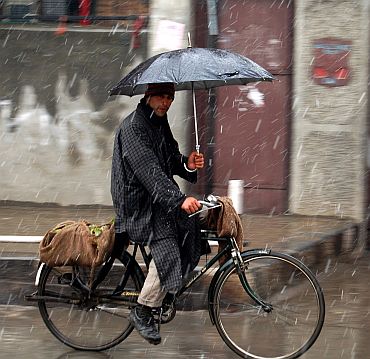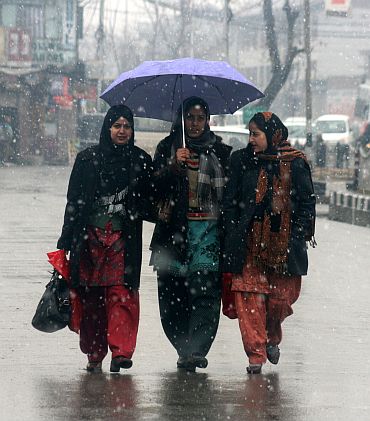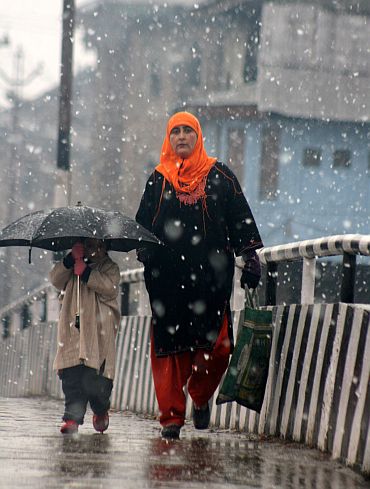Photographs: Umar Ganie Mukhtar Ahmad in Srinagar
In contrast to past many years, the Kashmir Valley has been in the throes of a severe winter this season.
While local Kashmiris are busy working out ways and means to brave the harsh winter with night temperatures falling to minus 6.6 degrees Celsius in Srinagar city and minus 9.0 degrees in the foothill villages of north and south Kashmir areas, scientists are engaged in a hot debate about the real causes for the present harsh winter in the region.
Scientists attribute the present harsh winter conditions to many global phenomena.
...
Kashmiris brave unusually harsh winter
The current phase of severe cold is not unique to Kashmir. The protagonists of anthropogenically-induced (caused by humans) global warming/climate change would, as usual, like to describe the current phase of severe cold to high carbon dioxide content in the atmosphere. Scientific facts are, however, different.
"First, it is winter in the northern hemisphere and then the equatorial Pacific Ocean is in La Nina phase. It is the latter that has given an extra bite to usual winter chill this season. La Nina is a coupled ocean-atmosphere weather phenomenon that causes greater upwelling of deeper, cold waters along eastern equatorial Pacific Ocean," explains eminent geologist Dr M I Bhat.
The upwelling of cold waters reduces sea surface temperatures (usually by 3-5 degrees Celsius), which, in turn, affect global temperatures.
"La Nina is opposite of El Nino. During El Nino phase -- as was the case during 2009-2010 when we had a rather warm winter in Kashmir -- sea surface temperatures in equatorial Pacific rise above normal, resulting in higher than normal global temperatures. Most computer models predict La Nina to last until Spring; a few predict, it could extend until summer," he added.
Kashmiris brave unusually harsh winter
While it remains a subject of scientific interpretation by the academicians and research scholars as to what causes the present severe winter conditions here, locals are busy trying all the traditional grandmother recipes out in the Valley to keep body and soul together as the temperature dropped to a bone chilling minus 6.6 degrees Celsius recently.
One of the most favoured of these recipes is the Shabdeg (duck cooked with turnips over the simmering fire in a sealed earthen vessel for the entire night).
"The cooking of the Shabdeg has been a tradition, which imparted cohesion and commonality to the extended family system of Kashmir," says Abdul Quyoom.
Besides the Shabdeg, smoked fish dish called 'Fary Gad' and dried fish dish called 'Hukh Gad' have also been traditionally used by the locals during the winter months to provide additional calories needed in the chilly weather that continues in the Valley from middle of December to the end of February each year.
Vegetables would be collected and dried during the plentiful summer months and preserved to support the families during the winter months when all road links between the Valley and the rest of the World would usually snap down.
Kashmiris brave unusually harsh winter
Markets are, these days, flooded with dried vegetables and smoked fish for those who have not heeded the grandmother's advice to prepare for the harsh winters.
"Another high calorie dish, which is famous here is the 'Harisa'. It consists of minced and beaten mutton that is mixed with some cooked rice and spices in a huge vessel, which is constantly stirred and kept on simmering flame for the night," says Mohammad Afzal, a schoolteacher.
"The Harisa is eaten early in the morning during with the local Tandoori bread in winter to provide additional calories to the locals for the chilly winter days," he adds.
Meanwhile, fresh snowfall lashed Kashmir again on Friday closing the Valley's only road link with rest of the country.
A white blanket of snow covered the Valley on Friday evening as snowfall intensified.





article